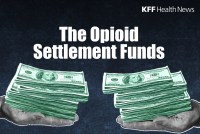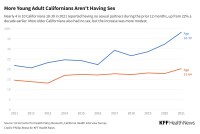Latest KFF Health News Stories
An Arm and a Leg: Credit Card, Please
What do you do when a medical provider asks you to provide a credit card upfront? In this episode, we hear advice about your options in this situation.
Need to Get Plan B or an HIV Test Online? Facebook May Know About It
Twelve of the largest drugstores in the U.S. sent shoppers’ sensitive health information to Facebook or other platforms, according to an investigation by The Markup and KFF Health News.
What the Health? From KFF Health News: A Year Without Roe
It’s been a year since the Supreme Court overturned Roe v. Wade and, with it, the nationwide right to abortion. The decision in Dobbs v. Jackson Women’s Health Organization set off widespread uncertainty in government and the courts about the legality or illegality of the procedure. But the decision has had other consequences too, including affecting where health professionals choose to locate. In this special episode of KFF Health News’ “What the Health?” Alice Miranda Ollstein of Politico, Shefali Luthra of The 19th, and Sandhya Raman of CQ Roll Call join KFF Health News chief Washington correspondent Julie Rovner to discuss these issues and more. Also this week, Rovner interviews KFF’s Alina Salganicoff about the organization’s research and other work on women’s health policy over the past year.
What does a day in the life of the nation’s top health official really look like? And how much of their agenda is set by the White House? In this special episode of KFF Health News’ “What the Health?” — taped before a live audience at Aspen Ideas: Health, part of the Aspen Ideas Festival, in Aspen, Colorado — host and chief Washington correspondent Julie Rovner leads a rare conversation with the current and two former U.S. secretaries of Health and Human Services. Secretary Xavier Becerra and former secretaries Kathleen Sebelius and Alex Azar talk candidly about what it takes to run a department with more than 80,000 employees and a budget larger than those of many countries.
What You Need to Know About the Opioid Settlement Funds
States and localities are receiving more than $54 billion over nearly two decades.
Opioid Settlement Payouts to Localities Made Public for First Time
KFF Health News obtained documents showing the exact dollar amounts — down to the cent — that local governments have been allocated in 2022 and 2023 to battle the ongoing opioid crisis.
Find Out How Much Opioid Settlement Cash Your Locality Received
You can use documents obtained by KFF Health News to see the exact dollar amounts that local governments in your state have been allocated in 2022 and 2023.
What the Health? From KFF Health News: Slow Your Disenroll
More than a million Americans have lost Medicaid coverage since pandemic protections ended. The Biden administration is asking states to slow disenrollment, but that does not mean states must listen. Meanwhile, a Supreme Court decision gives Medicaid beneficiaries the right to sue over their care, and a new deal preserves coverage of preventive services nationwide as a Texas court case continues. Rachel Cohrs of Stat, Alice Miranda Ollstein of Politico, and Sandhya Raman of CQ Roll Call join KFF Health News’ Mary Agnes Carey to discuss these issues and more. Also this week, KFF Health News’ Julie Rovner interviews Dan Mendelson, CEO of Morgan Health, a new unit of JPMorgan Chase, about employers’ role in insurance coverage.
Biden Admin Implores States to Slow Medicaid Cuts After More Than 1M Enrollees Dropped
Secretary of Health and Human Services Xavier Becerra is asking states to make more of an effort to keep eligible Medicaid recipients enrolled. He particularly fears children losing health insurance coverage.
What Does a Chatbot Know About Eating Disorders? Users of a Help Line Are About to Find Out
The National Eating Disorders Association’s help line has seen demand climb to unsustainable levels since the beginning of the covid pandemic, with more people reporting severe mental health problems, the nonprofit says. But staffers worry this chatbot may make things worse.
What the Health? From KFF Health News: Debt Deal Leaves Health Programs (Mostly) Intact
The bipartisan deal to extend the U.S. government’s borrowing authority includes future cuts to federal health agencies, but they are smaller than many expected and do not touch Medicare and Medicaid. Meanwhile, Merck & Co. becomes the first drugmaker to sue Medicare officials over the federal health insurance program’s new authority to negotiate drug prices. Joanne Kenen of the Johns Hopkins Bloomberg School of Public Health and Politico, Lauren Weber of The Washington Post, and Jessie Hellmann of CQ Roll Call join KFF Health News’ chief Washington correspondent, Julie Rovner, to discuss these issues and more. Also this week, Rovner interviews KFF Health News senior correspondent Sarah Jane Tribble, who reported the latest KFF Health News-NPR “Bill of the Month” feature, about the perils of visiting the U.S. with European health insurance.
An Arm and a Leg: A ‘Payday Loan’ From a Health Care Behemoth
UnitedHealth Group is the largest health insurer in the United States. And it keeps growing. This has led some health care experts to call for antitrust regulation of this “behemoth” company.
What the Health? From KFF Health News: Our 300th Episode!
When KFF Health News’ “What the Health?” podcast launched in 2017, Republicans in Washington were engaged in an (ultimately unsuccessful) campaign to “repeal and replace” the Affordable Care Act. The next six years would see a pandemic, increasingly unaffordable care, and a health care workforce experiencing unprecedented burnout. In the podcast’s 300th episode, host and chief Washington correspondent Julie Rovner explores the past and possible future of the U.S. health care system with three prominent “big thinkers” in health policy: Ezekiel Emanuel of the University of Pennsylvania, Jeff Goldsmith of Health Futures, and Farzad Mostashari of Aledade.
Watch: Payback for the Opioid Crisis: How Did the Sackler Family Skirt Liability?
KFF Health News senior correspondent Aneri Pattani appeared on PBS NewsHour to discuss the ruling surrounding drugmaker Purdue Pharma’s role in the opioid crisis and her reporting into the ongoing distribution of opioid settlement funds.
As Medicaid Purge Begins, ‘Staggering Numbers’ of Americans Lose Coverage
In what’s known as the Medicaid “unwinding,” states are combing through rolls to decide who stays and who goes. But the overwhelming majority of people who have lost coverage so far were dropped because of technicalities, not because officials determined they are no longer eligible.
Many People Living in the ‘Diabetes Belt’ Are Plagued With Medical Debt
The “Diabetes Belt,” as defined by the Centers for Disease Control and Prevention, comprises 644 mostly Southern counties where diabetes rates are high. Of those counties, KFF Health News and NPR found, more than half also have high levels of medical debt.
What the Health? From KFF Health News: When an Anti-Vaccine Activist Runs for President
Robert F. Kennedy Jr.’s official entry into the presidential race poses a thorny challenge for journalists: how to cover a candidate who’s opposed to vaccines without amplifying misinformation. And South Carolina becomes the latest state in the South to ban abortion after roughly six weeks of pregnancy. Alice Miranda Ollstein of Politico, Rachel Cohrs of Stat, and Sarah Karlin-Smith of the Pink Sheet join KFF Health News chief Washington correspondent Julie Rovner to discuss these issues and more. Also this week, Rovner interviews KFF Health News senior correspondent Aneri Pattani about her project to track the billions of dollars coming from opioid makers to settle lawsuits.
A Trans Teen No Longer Feels Welcome in Florida. So She Left.
Josie sensed Florida lawmakers were threatening her health care and ability to be herself at school. So she left. Families of other trans youth are plotting exits as well.
Young People Are Having Less Sex Than Their Parents Did at Their Age. Researchers Explore Why.
The percentage of young adults not having sex was rising even before covid made dating harder. Data and research suggest economic precarity, technology, and the warping effects of porn on sexual attitudes may play a role.
Por qué los adultos jóvenes tienen menos sexo que el que tuvieron sus padres
La cantidad de adultos jóvenes que no tienen relaciones sexuales ya estaba aumentando antes de que covid-19 hiciera que las citas fueran más difíciles y riesgosas.




















